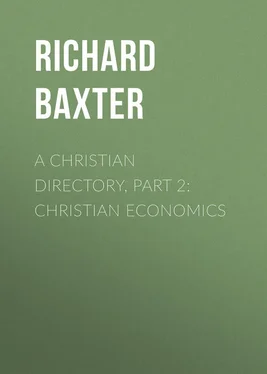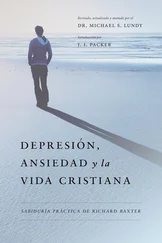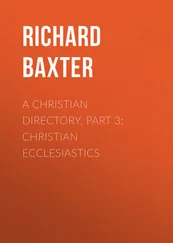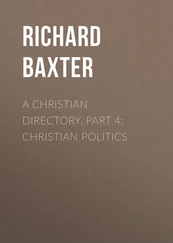Richard Baxter - A Christian Directory, Part 2 - Christian Economics
Здесь есть возможность читать онлайн «Richard Baxter - A Christian Directory, Part 2 - Christian Economics» — ознакомительный отрывок электронной книги совершенно бесплатно, а после прочтения отрывка купить полную версию. В некоторых случаях можно слушать аудио, скачать через торрент в формате fb2 и присутствует краткое содержание. Жанр: foreign_antique, foreign_prose, на английском языке. Описание произведения, (предисловие) а так же отзывы посетителей доступны на портале библиотеки ЛибКат.
- Название:A Christian Directory, Part 2: Christian Economics
- Автор:
- Жанр:
- Год:неизвестен
- ISBN:нет данных
- Рейтинг книги:5 / 5. Голосов: 1
-
Избранное:Добавить в избранное
- Отзывы:
-
Ваша оценка:
- 100
- 1
- 2
- 3
- 4
- 5
A Christian Directory, Part 2: Christian Economics: краткое содержание, описание и аннотация
Предлагаем к чтению аннотацию, описание, краткое содержание или предисловие (зависит от того, что написал сам автор книги «A Christian Directory, Part 2: Christian Economics»). Если вы не нашли необходимую информацию о книге — напишите в комментариях, мы постараемся отыскать её.
A Christian Directory, Part 2: Christian Economics — читать онлайн ознакомительный отрывок
Ниже представлен текст книги, разбитый по страницам. Система сохранения места последней прочитанной страницы, позволяет с удобством читать онлайн бесплатно книгу «A Christian Directory, Part 2: Christian Economics», без необходимости каждый раз заново искать на чём Вы остановились. Поставьте закладку, и сможете в любой момент перейти на страницу, на которой закончили чтение.
Интервал:
Закладка:
Yet further we find in Scripture, that the particular family relations are expressly sanctified. The family complete consisteth of three pairs of relations; husband and wife, parents and children, masters and servants. Husbands must love their wives with a holy love in the Lord, even as "the Lord loved the church, who gave himself for it, to sanctify and cleanse it by the washing of water by the word, that he might present it to himself a glorious church," Eph. v. 25-27. "Wives must submit themselves to their husbands as unto the Lord; and be subject to them, as the church is to Christ," Eph. v. 22-24. "Children must obey their parents in the Lord," Eph. vi. 1. "Parents must bring up their children in the nurture and admonition of the Lord," Eph. vi. 4. "Servants must be obedient unto their masters as unto Christ, and as the servants of Christ, doing the will of God from their hearts with good will, doing service as to the Lord, and not to man; knowing that what good thing any man doth, the same shall he receive of the Lord, whether he be bond or free: and masters must do the same to them, knowing that their Master is in heaven," Eph. vi. 5-9. So that it is evident that every distinct family relation is dedicated or holy to God and to be used to the utmost for God. I shall have occasion to make further use anon of these texts for the particular sorts of worship, though I now make use of them as for worship in general.
Arg. V. The several sorts of solemn worship in and by christian families, are found, appointed, used, and commanded in the Scripture, therefore it may well be concluded of worship in the general; seeing the genus is in each species. But this argument brings me to the second part of my undertaking; viz. to prove the point as to some special kinds of worship; which I the more hasten to, because in so doing I prove the general also.
II. Concerning God's worship in special, I shall speak but to two or three of the chief parts of it, which belong to families.
And, 1. of teaching, under which I comprise,
1. Teaching the letter of the Scripture, (1.) By reading it. (2.) By teaching others to read it. (3.) Causing them to learn it by memory, which is a kind of catechising.
2. Teaching the sense of it.
3. Applying what is so taught by familiar reproofs, admonitions, and exhortations.
Prop. II. It is the will of God that the rulers of families should teach those that are under them the doctrine of salvation, i.e. the doctrine of God concerning salvation, and the terms on which it is to be had, and the means to be used for attaining it, and all the duties requisite on our parts in order thereunto.
Before I come to the proof, take these cautions: 1. Where I say men must thus teach, I imply they must be able to teach, and not teach before they are able; and if they be not able it is their own sin, God having vouchsafed them means for enablement. 2. Men must measure their teaching according to their abilities, and not pretend to more than they have, nor attempt that which they cannot perform, thereby incurring the guilt of proud self-conceitedness, profanation, or other abuse of holy things. For example, men that are not able judiciously to do it, must not presume to interpret the original, or to give the sense of dark prophecies, and other obscure texts of Scripture, nor to determine controversies beyond their reach. 3. Yet may such conveniently study what more learned, able men say to such cases; and tell their families, this is the judgment of fathers, or councils, or such and such learned divines. 4. But ordinarily it is the safest, humblest, wisest, and most orderly way for the master of the family to let controversies and obscure Scriptures alone, and to teach the plain, few necessary doctrines commonly contained in catechisms, and to direct in matters of necessary practice. 5. Family teaching must stand in a subordination to ministerial teaching, as families are subordinate to churches; and therefore, (1.) Family teaching must give place to ministerial teaching, and never be set against it; you must not be hearing the master of a family, when you should be in a church hearing the pastor; and if the pastor send for servants or children to be catechised in any fit place or at any fit time, the master is not then to be doing it himself, or to hinder them, but they must go first to the pastor to be taught; also if a pastor come into a family, the master is to give place, and the family to hear him first. (2.) And therefore when any hard text or controversies fall in, the master should consult with the pastor for their exposition, unless it fall out that the master of the family be better learned in the Scripture than the pastor is, which is rare, and rarer should be, seeing unworthy ministers should be removed, and private men that are worthy should be made ministers. And the pastors should be the ablest men in the congregation. Now to the proof (remembering still that whatsoever proves it the ruler's duty to teach, must needs prove it the family's duty to learn, and to hearken to his teaching that they may learn).
Arg. I. From Deut. xi. 18-21, "Therefore shall you lay up these my words in your hearts, and in your soul, and bind them for a sign upon your hand, that they may be as frontlets between your eyes; and you shall teach them your children, speaking of them when thou sittest in thy house, and when thou walkest by the way, and when thou liest down, and when thou risest up; and thou shalt write them upon the door-posts of thy house, and upon your gates; that your days may be multiplied, and the days of your children." The like words are in Deut. vi. 6-8, where it is said, "And thou shalt teach them diligently unto thy children." So Deut. iv. 9, "Teach them thy sons, and thy sons' sons."
Here there is one part of family duty, viz. teaching children the laws of God, as plainly commanded as words can express it.
Arg. II. From these texts which commend this. Gen. xviii. 18, 19, "All the nations of the earth shall be blessed in him, for I know him that he will command his children and his household after him; and they shall keep the way of the Lord;" and it was not only a command at his death what they should do when he was dead; for, 1. It cannot be imagined that so holy a man should neglect a duty all his lifetime, and perform it but at death, and be commended for that. 2. He might then have great cause to question the efficacy. 3. As God commandeth a diligent inculcating precepts on children, so no doubt it is a practice answerable to such precepts that is here commended; and it is not bare teaching, but commanding, that is here mentioned, to show that it must be an improvement of authority, as well as of knowledge and elocution.
So 2 Tim. iii. 15. From a child Timothy knew the Scripture by the teaching of his parents, as appeareth, 2 Tim. i. 5.
Arg. III. Eph. vi. 4, "Bring them up in the nurture and admonition of the Lord;" παιδεία, translated nurture, signifieth both instruction and correction, showing that parents must use both doctrine and authority, or force, with their children for the matters of the Lord; and νουθεσία, translated admonition, signifieth such instruction as putteth doctrine into the mind, and chargeth it on them, and fully storeth their minds therewith; and it also signifieth chiding, and sometimes correction. And it is to be noted, that children must be brought up in this; the word ἐκτρέφετε, signifying carefully to nourish, importeth that as you feed them with milk and bodily food, so you must as carefully and constantly feed and nourish them with the nurture and admonition of the Lord. It is called the nurture and admonition of the Lord, because the Lord commandeth it, and because it is the doctrine concerning the Lord, and the doctrine of his teaching, and the doctrine that leadeth to him.
Читать дальшеИнтервал:
Закладка:
Похожие книги на «A Christian Directory, Part 2: Christian Economics»
Представляем Вашему вниманию похожие книги на «A Christian Directory, Part 2: Christian Economics» списком для выбора. Мы отобрали схожую по названию и смыслу литературу в надежде предоставить читателям больше вариантов отыскать новые, интересные, ещё непрочитанные произведения.
Обсуждение, отзывы о книге «A Christian Directory, Part 2: Christian Economics» и просто собственные мнения читателей. Оставьте ваши комментарии, напишите, что Вы думаете о произведении, его смысле или главных героях. Укажите что конкретно понравилось, а что нет, и почему Вы так считаете.












